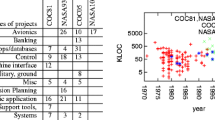Abstract
In this article we present a method for estimating the effort of software projects following an evolutionary, object-oriented development paradigm. Effort calculation is based on decomposing systems into manageable building blocks (components, subsystems, classes), and assessing the complexity for all their associated development cycles. Most terms of the complexity calculation formulae carry coefficients which represent their individual weights ranging from factors for particular features up to general influence factors of the project environment. These coefficients can continuously be improved by statistical regression analysis. Outstanding features of the method are its flexibility (allowing estimations for project portions of any size) and its capability to deal with dynamic adjustments which might become necessary due to changed plans during project progress. This capability reflects the evolutionary character of software development and, in particular, implies revision, use and evaluation activities.
Access this chapter
Tax calculation will be finalised at checkout
Purchases are for personal use only
Preview
Unable to display preview. Download preview PDF.
Similar content being viewed by others
References
Albrecht, A.J.: Measuring Applications Development Productivity. In: Proceedings of IBM Applications Devision Joint SHARE/GUIDE Symposium, Monterey, CA (1979) 83–92
Boehm, B.W.: Software Engineering Economics. Prentice Hall (1981)
Dumke, R., Abran, A.: Software Measurement / Current Trends in Research an Practice. Wiesbaden: Deutscher Universitätsverlag (1999)
van Genuchten, M.: Why is Software Late? An Empirical Study of Reasons For Delay in Software Development, In: IEEE Transaction on Software Engineering 17(1991)6, 582–590
Hesse, W.: Life cycle models of object-oriented software development methodologies. Marburg: A. Zendler et al.: Advanced concepts, life cycle models and tools for objectoriented software development. Reihe Softwaretechnik 7, Tectum Verlag Marburg (1997)
Hesse, W.: Improving the software process guided by the EOS model. In: Proc. SPI’ 97 European Conference on Software Process Improvement, Barcelona (1997)
Hesse, W.: Wie evolutionär sind die objekt-orientierten Analysemethoden? Ein kritischer Vergleich. In: Informatik-Spektrum 20.1 (1997) 21–28
ISO/IEC 9126: Information technology-Software Product Evaluation-Quality Characteristics and Guidelines for Their Use (1991)
Nesi, P., Querci, T.: Effort estimation and prediction of object-oriented systems. In: The Journal of Systems and Software 42 (1998) 89–102
Rousseeuw, P.J., Van Aelst, S.: Positive-Breakdown Robust Methods in Computer Vision. Department of Mathematics and Computer Science, U.I.A., Belgium (1999)
Sneed, H.M.: Schätzung der Entwicklungskosten von objektorientierter Software. In: Informatik Spektrum 19 (1996) 133–140
Vaske, H.: Systemhäuser zeigen Schwäche im Support. In: Computerwoche, Nr. 11, März (1999) 9–10
Zuse, H.: A Framework of Software Measurement. Berlin/New York: Walter de Gruyter, (1998)
Author information
Authors and Affiliations
Editor information
Editors and Affiliations
Rights and permissions
Copyright information
© 2001 Springer-Verlag Berlin Heidelberg
About this paper
Cite this paper
Sarferaz, S., Hesse, W. (2001). CEOS - A Cost Estimation Method for Evolutionary, Object-Oriented Software Development. In: Dumke, R., Abran, A. (eds) New Approaches in Software Measurement. IWSM 2000. Lecture Notes in Computer Science, vol 2006. Springer, Berlin, Heidelberg. https://doi.org/10.1007/3-540-44704-0_3
Download citation
DOI: https://doi.org/10.1007/3-540-44704-0_3
Published:
Publisher Name: Springer, Berlin, Heidelberg
Print ISBN: 978-3-540-41727-9
Online ISBN: 978-3-540-44704-7
eBook Packages: Springer Book Archive




